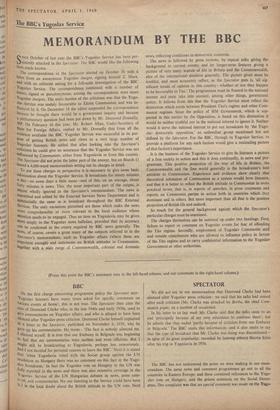g The BBC s Y ugoslav Service
MEMORANDUM BY THE BBC
SINCE October of last year the BBC's Yugoslav Service has been per- sistently attacked in the Spectator. The BBC would like the following facts made known.
The correspondence in the Spectator started on October 30 with a letter from an anonymous Yugoslav émigré, signing himself Z. Marn, and with an editorial asking for a full-scale investigation of the BBC Yugoslav Service. The correspondence continued with a number of letters, signed or pseudonymous; among the correspondents were more Yugoslav emigres. The main burden of the criticisms was that the Yugo- slav Service was unduly favourable to Titoist Communism and was in- fluenced by it. On December 18 the editor suspended the correspondence because he thought there would be a government inquiry and because a Parliamentary question had been put down by Mr. Desmond Donnelly, VIP. On February 10 _this year, Mr. Robert Allan, Under-Secretary of State for Foreign Affairs, replied to Mr. Donnelly that from all the evidence available the BBC Yugoslav Service was successful in its pur- pose of getting British news and views to a very large number of Yugoslav listeners. He added that after looking into the Spectator's criticisms he could give an assurance that the Yugoslav Service was not influenced by Communists, either from Yugoslavia or from this country. The Spectator did not print the latter part of the answer, but on March I I issued a 4,000-word memorandum setting out its charges in detail. To put these charges in perspective it is necessary to give some basic information about the Yugoslav Service. It broadcasts for ninety minutes a day-----on some days a little more—and of this, on an average, about forty minutes is news. This, the most important part of the output, is almost ,wholly ignored in the Spectator's memorandum. The news is assembled and edited by the External Services News Department and is substantially the same as is broadcast throughout the BBC External Services. The only variations permitted are those which make the news more comprehensible or more relevant to the local audience whose attention needs to be engaged. Thus an item on Yugoslavia may be given more amply in the Yugoslav news bulletins, provided that its accuracy can be confirmed to the extent required by BBC news generally. The news, of course, covers a great many of the subjects referred to in the Spectator's memorandum, such as Yugoslav affairs (where these are important enough) and statements on British attitudes to Communism, together with a wide range of Commonwealth, colonial and domestic
news, reflecting conditions in democratic countries.
The news is followed by press reviews; by topical talks giving the background to current events; and by longer-term features giving a picture of very many aspects of life in Britain and the Commonwealth, also of the international- situation generally. The picture given must be truthful, and must accurately reflect, as the Spectator puts it, 'all sig- nificant trends of opinion in this country—whether or not they happen to be favourable to Tito.' The programmes must be framed in the national interest and must take into account, among other things, government policy. It follows from this that the Yugoslav Service must reflect the distinction which exists between President Tito's regime and other Com- munist regimes. Since the policy of H M Government, which is sup- ported in this matter by the Opposition, is based on this distinction it would be neither truthful nor in the national interest to ignore it. Neither would it serve the national interest to put out broadcasts by 'the Yugo- slav democratic opposition,' an unfamiliar group mentioned but not defined by the Spectator. For the BBC, through its Yugoslav Service, to provide a platform for any such faction would give a misleading picture of that faction's importance.
It is the business of the Yugoslav Service to give its listeners a picture of a free society in action and this it does continually, in news and pro- grammes. This positive projection of the way of life in Britain, the Commonwealth and the free world generally is the broadcaster's best antidote to Communism. Experience and evidence show clearly that theoretical refutation of Communism as a system would bore listeners, and that it is better to reflect the British attitude to Communism in more practical terms, that is, in reports of speeches, in press comments and reports on Communist parties in action both in countries which they dominate and in others. But more important than all that is the positive projection of British life and outlook.
So much for the general background against which the Spectator's particular charges must be examined.
The charges themselves can be summed up under two headings. First, failure to report or comment on Yugoslav events for fear of offending the Tito regime. Secondly, employment of Yugoslav Communist staff and outside contributors who are allowed to influence policy in favour of the Tito regime and to carry confidential information to the Yugoslav Government or other authorities.


































 Previous page
Previous page